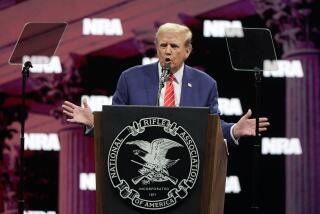Bush Blasts Rival Anti-Crime Legislation : Law enforcement: He calls Biden’s bill a ‘sheep in wolf’s clothing.’ His trip to Kansas City focuses on volunteer drug fighters.
- Share via
KANSAS CITY — President Bush, decrying ghetto drug dealers who “see their fellow man the way a pack of jackals sees a wounded fawn,” fired a full blast of verbal artillery Tuesday at a Democrat’s alternative to his anti-crime legislation.
On the day that Congress returned to Washington, Bush took to the road, telling a law enforcement audience in the nation’s heartland that “America needs a crime bill with teeth--but this is a sheep in wolf’s clothing.”
Among other things, the measure proposed by Sen. Joseph R. Biden Jr. (D-Del.), chairman of the Senate Judiciary Committee, would impose controls on domestically produced semiautomatic assault weapons. Bush has supported limits only on imported semiautomatic weapons.
Using some of the toughest language he has employed in his anti-drug campaign, the President defended punishment as “a moral, civilized response to wrong,” and not, “as some may see it, an unseemly indulgence in revenge.”
“The fact of the matter is, the criminal chooses his way of life, his companions, the kind of crimes he commits. He is not the victim--he is the victimizer,” Bush said.
With Congress facing an election-year agenda that includes the carried-over anti-crime bill he proposed last May as well as several competing measures, the President used a meeting with a neighborhood patrol group, a two-block stroll in an inner-city neighborhood--including a walk through a one-time crack house--and a speech to law enforcement officers as platforms for his opening volleys in the renewed anti-crime debate.
Invoking the mood of the Wild West and the names of two lawmen who helped tame it--Wild Bill Hickok and Bat Masterson--the President declared: “Today, too many law-abiding Americans are prisoners in their own homes. We’ve got to change that. The wrong people are behind bars.”
Biden’s bill, the focus of the President’s complaint, would not go as far as the Administration’s proposal in allowing the use of evidence seized under questionable circumstances.
“It looks like a real crime bill. Sounds like a real crime bill. But take a look at it,” Bush said. “In actuality it will be tougher on law enforcement than on criminals.”
He said that Biden’s proposed changes in the “exclusionary rule” governing the use of evidence in criminal cases, as well as structural changes in the Justice Department’s crime-fighting divisions, “will only entrench and extend the legal loopholes and red tape that disrupt honest law enforcement.”
In Washington, Biden, responding to Bush’s criticism, said he had only “minor differences” with the President over the exclusionary rule and contended that his bill would do more than the White House initiative to provide significant new assistance to local law enforcement agencies.
“I hope and expect that we will be able to come up with a bipartisan crime package,” Biden said in a statement, “one that . . . limits assault weapons and allocates the resources our law enforcement community needs to make a real difference in reducing crime.”
The Ad Hoc Committee Against Crime, the group with which Bush met before delivering his speech to the law enforcement officers, is made up of community volunteers who work with local authorities, including police, schools, courts, city agencies, businesses and the news media, to focus attention on the dangers of drugs.
Stymied in his campaign to fight an international battle against illegal drug trafficking by boosting the U.S. military’s role in Latin American drug interdiction, Bush has sought to focus attention on local groups, often formed by volunteers, that have taken up the battle in individual communities.
More to Read
Sign up for Essential California
The most important California stories and recommendations in your inbox every morning.
You may occasionally receive promotional content from the Los Angeles Times.













